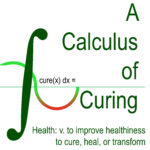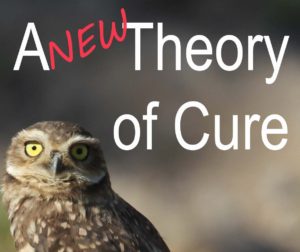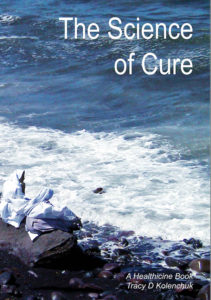Two medical researchers meet in the university lab. Jim is excited. John is interested.
Jim: “I’ve found the cure for cancer! All we need are some clinical studies proving it works and the Nobel Prize in Medicine is ours.”
John: “Hey! I’m pumped. … But wait a minute, how can we do a clinical study that tests a cancer cure?“
Jim: “Easy! We enlist some cancer patients, treat them with the cure protocol. After their cancer is cured, we publish the results. It’s that simple. Of course we’ll need to register the study, comply with appropriate bureaucratic and human rights legislation, but the University knows how to get that done.”
John looks confused: “But how do we prove the patients are ‘cured’?”
“It’s obvious!” Jim retorts: “Their cancer is gone. They are cured!”
John: “Actually, it’s not obvious. How can we prove the cancer is gone. Maybe it’s just in remission. Maybe it’s not really a cure?”
Jim is getting excited, “That’s the great part. Today’s cancer cures try to ‘kill’ the cancer. Of course you can never be certain you’ve killed all of the cancer cells. And they don’t address the cause of the cancer at all. So of course it returns even if you do kill all of the cancer cells.”
John: “And our cure is different?”
Jim: “You bet it’s different. We don’t try to kill the cancer cells, we health the body. When the body is healthy, it naturally removes the cancer cells, and no more can grow.”
John objects: “Health isn’t a verb. It’s a noun.”
Jim is still excited, “It’s going to be a verb. We’re going to win the Nobel Prize!”
John: “But how can we prove the cancer is cured?”
Jim slows down, and asks, “What are you getting at?”
John: “There is no scientific or medical protocol to prove a case of cancer has been cured.” There is no scientific or medical protocol to prove a #cure in any case of cancer Share on X
“What???”
John continues: “Cured is not defined for cancer. There is no definition of a cancer cure. It’s impossible to define a cancer cure study, because we can’t prove a cancer has been cured.”
Jim asks, “What about all of those people searching for cure? What about all those people running for the cure, shaving their head for the cure, raising money for the cure?”
John, quietly, “Haven’t you noticed, many of the cancer fundraising websites have quietly removed the word ‘cure’ from their main pages. There are some organizations still raising funds for a cure – but their parent organizations have stopped using the word cure. ‘Run for the Cure’ has become ‘Run for the Cause’, but they don’t mean the ’cause of cancer, they mean the fundraising cause.”
“You can’t be serious,” Jim replies with incredulity.
John goes on, “Look at the American Cancer Society. Their website says they are ‘Dedicated to helping persons who face cancer. Supports research, patient services, early detection, treatment and education.‘ Their mission is “The American Cancer Society is the nationwide, community-based, voluntary health organization dedicated to eliminating cancer as a major health problem by preventing cancer, saving lives, and diminishing suffering from cancer, through research, education, advocacy, and service” They don’t use the word ‘cure’ in their mission. If you search their site for the word cure, you will see a claim that they have spent 4 billion dollars since 1946 to find cures, but other pages reference a 4 billion dollar expenditure on research. If you check their ‘areas of research’, you will find biology, cause, treatment, prevention, early detection, diagnosis, etc… but no mention of ‘cure’. There are some references to finding a cure, but most of them are more than 5 years old. Cure is not defined, so there is no point in searching for one…”
Jim: “Well, if there is no scientific definition of a cancer cure, we’ll have to make one.”
John: “But, You can’t just make up your own rules about a cancer cure, and then design an experiment to test the rules you made up…”
Jim: “Surely, if we treat people who have cancer, and their cancer goes away, and doesn’t come back – they are cured. That might take sometime, but we can eventually prove it is a cure.”
“That won’t work. It happens every day.“, John says smugly.
Jim: “What happens every day?”
John: “Some people claim have cured their cancer. Someone claims their cancer is cured. But, there is no test for a cure. There is no way to prove the cancer is cured. Because there is no test for a cure, these people, these ‘cure claims’, are just ‘anecdotal evidence’.”
Jim: “Anecdotal evidence?”
John: “Yes, a claim, without proof. Anecdotal evidence.”
Jim: “That’s not really anecdotal evidence. Anecdotal evidence is when someone tells me they were cured, and then I tell you. I’m telling you an anecdote. When they tell me, it’s their truth, it’s not an anecdote.”
John: “Well… the medical systems call it anecdotal evidence… You can’t really argue with all those PhDs.”
Jim: “But what if one of them is actually a cure?”
John: “We can’t tell. There is no way to recognize a cure. Cure is not defined for cancer. There is no test for a cancer cure. No medical test. No scientific test. No legal test. None.”
Jim: “Hmmm. So we’re caught?”
John: “Yes, it’s the classic logic problem. A catch 22. You can’t find a cure for cancer, because cancer cure is not defined.”
Jim: “and of course we can’t define a cancer cure, until we find a cure for cancer?”
John: “You’ve got it. Catch 22. No bell prize for you. But if we work on it long enough, we might get tenure. That’s a goal we can achieve.”
============================
 Cure has been defined, in the book A Calculus of Curing. However, it will take some time, and some work to apply this definition to an illness as complex as cancer.
Cure has been defined, in the book A Calculus of Curing. However, it will take some time, and some work to apply this definition to an illness as complex as cancer.
to your health, tracy
Tracy is the author of two books about healthicine:




If I had cancer, I would want to know that the intervention was moving me on my health continuum toward wellness. I would continue to check for that continued improvement over the next year or more. The science to do those measurements is available.
Thanks for the comment. Of course if anyone has cancer they want to know how their ‘illness’ is doing. There are many measurements to track your ‘illness continuum’, but there are none to measure a ‘health’ continuum. The fact that we cannot measure health is explored in the Alice and Zizi series of blogs. http://healthicine.org/wordpress/health-test-alice-zizi-part-1/
The idea we can not measure health is a medical concept applied to the group called patients. When you use epigenetic based biochemical testing on an individual and monitor change over time their personal biochemical change is a measure of health or we call it a return to wellness.
? a measure of “personal biochemical change” is a measure of change, not a measure of health.
Health is whole. Each measure of health is a measure of wholeness or completeness, and can be represented as a percentage of healthiness. If the specific measure is presented as a percentage of perfection, for this individual, it is a measure of healthiness. Until the measure is expressed as a percentage of a health goal, it is not a measure of health. It is simply an observation without context, or an observation in context of the illness, but not in the context of health, which is larger than illness.
My post was in reference to the original question about “proving a cancer cure”. If you want biochemical proof of a return to wellness, then that is available.
Hey George, thanks for your input. I see from your other comments that you are a thinking person, and look forward to more interaction and discussions.
My interests are health, and cures. I’m not very interested in wellness – which I view as the opposite of illness, but not related to health. If we view health as whole, and illness as a hole in our health, then measuring wellness can be done by simply measuring how much the hole has shrunk. Measuring wellness does not create or improve our awareness of health and healthiness.
to your health, tracy
We must reduce cancer burden and provide cures. The primary roadblock to improvements in cancer care and cure is our inability to be able to define improved wellness.
Biochemistry tests need to link interventions to improved wellness.
Are we missing out on good nontoxic interventions?
Has the “alternative medical community” been using the
medical “yardstick” to define what is good?
There are many herbs and nontoxic interventions that support wellness, but may not cause the change in a tumor or disease that can be monitored by currently approved clinical methods.
When a patient starts on their long journey toward
wellness, they must continue to make sure they are on the right path. Without proper testing, the patient must put
complete trust in how others have responded to the intervention.
I think what we are missing is systemic. We are searching for ‘things’ that we might be missing, on the medical and the alternative medicine fronts – and not finding anything, even after decades of searching. Not a single cure, not a single cured patient has been found We’re looking in the wrong places, for the wrong things. That’s the point of my post.
It is my opinion that many people have been cured of cancer over many decades using herbs and lifestyle change. I agree the medical community has looked in the wrong place for the wrong thing. I purpose using the Biochemical Body Scan to look for the “right thing” (systemic change the result of epigenetic modification of proteins) on each individual client.
Ah ha! That’s exactly my point. It is also MY opinion that many people have been cured of cancer. I believe the main cure is lifestyle change, or I would simply say ‘improvements in health’. But our medical systems do not acknowledge any cures. There are no statistics for ‘people cured’. Our medical system has no way to recognize a cure, because they can’t recognize someone who has been cured.
There are a number of blood tests that look for certain tumour markers but they aren’t reliable enough for a treating medical oncologist to declare a patient ”cancer free.” There needs to be no detectable tumour on physical examination and/or imaging (like MRI), or on other imaging, such as PET-CT scans and bone scans, a state that is referred to as ”NED” which stands for ”no evidence of disease.” Conventional medicine doesn’t consider breast cancer patients cured at five years. Most now usually speak of ten year survival, because it’s been know that breast cancer, particularly estrogen receptor-positive breast cancer, can recur later. Also, when an oncologist uses survival for five years as a surrogate for cure, it is assumed that the cancer has been treated and there is no detectable disease in that patient. As for statistics then based on data from England and Wales that was gathered during 2010-11 then across all types (many hundreds) and stages 50% of all patients are predicted to survive for 10 years or longer http://www.cancerresearchuk.org/health-professional/cancer-statistics/survival
All the patients in this trial by Juno were given 1st gen CAR-T cell therapy after becoming relapsed/refractory to all standard therapies, everything else had failed and all of them only had 3-6 months to live. Not only did they use scans and blood tests but also used the highly sensitive technique of IGH deep sequencing to confirm a complete molecular remission of the patients on the trial. They are followed up every ‘x’ amount of months and still have blood tests and scans to check they are still in remission. From the trial this is the 3 year survival rate which is pretty encouraging.
http://s8.postimg.org/rg13mrgad/Screen_Hunter_000038227_Saturday_March_26_2016.jpg
Cancer free is simply not cancer cured.
If you have something causing cancer cells to grow, or some weakness in your immune system that ignores or fails to address cancerous cells – it makes no difference if you are currently ‘cancer cell free’.
Until the cause has been addressed, you are not cured, and the cancer will re-grow. Searching for cancer markers, is like pulling all of the visible weeds in a garden (but not the dormant weed seeds) and declaring the garden ‘cured of weeds’.
It’s not possible to declare a garden ‘weed free’ until you believe the cause of the weeds has been eliminated. In the case of a garden, this is only accomplished by several cycles of growing the garden, and diligently pulling out every weed that appears, until the seeds are depleted. It is still possible for weeds to arrive – via birds, wind, etc. but these are ‘new cases of weeds’.
Likewise, with cancers, we need to address the present source of the cancer cells, the cause of the current cancer cells, if we are to declare the cancer cured. The patient might get a new cancer, from a new cause – but that would be a new cancer, while the older cancer was cured. Killing the present cancer cells is important – but it is simply not a cure.
Of course,in practice, this is a difficult challenge, with some ambiguity. As is the garden problem. But ignoring the challenge, and attempting to define ‘cured’ by killing all of the cancer cells that are currently present – is avoiding the issue, avoiding the cause.
to your health, tracy
There is a very good definition of cure that sadly gets forgotten, ignored, and abused in oncology https://static1.squarespace.com/static/55550f38e4b0884d8d80118e/t/555f5c3de4b06ffb7e96911f/1432312893985/2014+-+Feb+-+AJHPC+-+Use+of+Word+Cure.pdf
Very interesting article, it helps flesh out some of my research. However… The definition of cure given, if I read correctly is “Approximately one-third (34.5%) of the articles used the word consistent with the definition that, after a set period of time, some surviving subset of patients experience survival similar to normal controls.”
This definition has many weaknesses. It implies, but does not state directly that the ‘cure’ is a result of a ‘treatment’. But cancer patients “experience survival similar to normal controls” actually live their entire lives, living out many actions that may have resulted in the ‘cure’.
It does not make any reference to cause. I have not found a single definition of cure in any dictionary – standard or medical – that uses the word cause. Can you imagine if you took your car to a mechanic, and they claimed to ‘fix’ the problem without identifying the cause? Claiming a cure without addressing cause is mysticism, not science.
The basic problem with this definition of cure, is that it cannot actually be used to claim a ‘cure’ for anyone who is still alive. It is a statistical definition, useful for groups of patients, useful to measure ‘treatments that do not attempt to address cause’, but it cannot be used to diagnose ‘cured’. It’s not even individual mysticism, it’s statistical mysticism.
The article also makes several mentions of ‘incurable’ with regards to cancer, but does not appear to recognize that incurable is not defined either, nor that incurable can never be proven. “incurable” is always “) currently considered
incurable”.
There are three useful definitions of cured, depending on the illness.
1. Illnesses with an active cause are cured by addressing the cause.
2. Injury illnesses are cured by healing.
3. Blockage illnesses are cured by transformation (eg. surgery).
In each of these cases, the illness and the cure can be articulated for specific patients, and a cure can be diagnosed, or at least measured. Healing, for example is seldom a 100 percent perfect cure. It often leaves disabilities, blockages which cannot be cured.
Most, perhaps all cases of cancer consist of a complex causal illness – one with more than a single cause – and an injury illness, the injuries caused by the causal illnesses, and possibly a blockage illness and corresponding congestion caused by the injury and subsequent healing. A case of cancer requires several cures to be completely cured. http://healthicine.org/wordpress/from-the-elements-of-illness-to-the-serenity-gap/
It is possible to demonstrate a cancer cured, although it would be unethical to do so in humans, it is easy to do so in animals. We need only:
1. Introduce a cause that causes local cancer in the animal.
2. Remove the cause.
3. Address the consequences.
The cancer is cured. It cannot recur, because the cause has been removed.
to your health, tracy